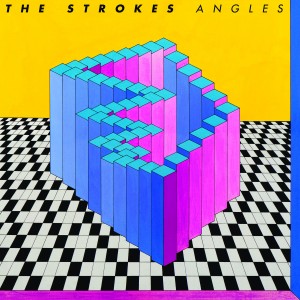After not releasing any new music for nearly five years, fans of The Strokes were elated to hear that the New York-based group was recording its fourth studio album. That was back in 2009, and finally in March, The Strokes dropped Angles, an album that sees the band forgetting the past and moving in to the future.
The Strokes, made up of Julian Casablancas, Nick Valensi, Albert Hammond Jr., Nikolai Fraiture and Fabrizio Moretti, got its big break in 2001 with the release of its first album, Is This It. Its success started off slow, garnering more attention in Europe before America joined the bandwagon. Two more albums and one extensive break later, consisting of various members pursuing solo projects, fans were given Angles, which is a large step away from the band’s previous music.

Angles is an interesting blend of futuristic melodies, rock n’ roll and, occasionally, tropical sounds, demonstrated in the first track, “Machu Picchu”. It is not a song you would expect coming from The Strokes, but that is the thing with the album: none of the songs are anything you would expect from the group.
However, the first single from the album and the second track, “Under Cover Of Darkness”, is the most similar to the band’s previous works. A fun and upbeat song, it contains fast paced guitars and halting vocals that lead into a flowing chorus. One of the great things about the song is that it is one of the few where you can clearly understand the words Casablancas sings.
The Strokes are known for its garage rock sound, but not for the ‘80s rock coming with the third track, “Two Kinds of Happiness”. The song is resonant of something by The Police. With its hyperactive instruments, the vocals are a little drowned out but gain volume in the chorus.
One of the main factors in the change of sound is probably due to the band’s recording process for Angles. The songwriting was shared between all members, not just Casablancas, as it had been before. The instrumental parts of songs were recorded, and then Casablancas would come in and lay down the vocals.
Luckily, the new recording style does not hinder the quality of the album. With so many minds putting the album together, the outcome was different and though a little disorganized at times, still enjoyable and never monotonous.
The album transitions from bouncy and joyous tracks like “Taken For A Fool” to somber songs like “Call Me Back” and then back again. The eighth track, “Gratisfaction”, is a funky, soulful tune where Casablancas’ vocals really shine. He loses his usual bored and restrained tone, and seems to loosen up on the track before reeling it in on the ninth song, “Metabolism”.
Just a mere 10 tracks, Angles ends with the sober “Life Is Simple In The Moonlight”. It is not a standout track and does not end with a huge finale, but the quietness and subdued tones wind down the album as the song fades away.
Angles makes it apparent The Strokes knew what they were doing when they sat down to make the album. Lucky for fans, The Strokes have already started writing for a fifth album that will hopefully be as good as this one.
Grade: A-






